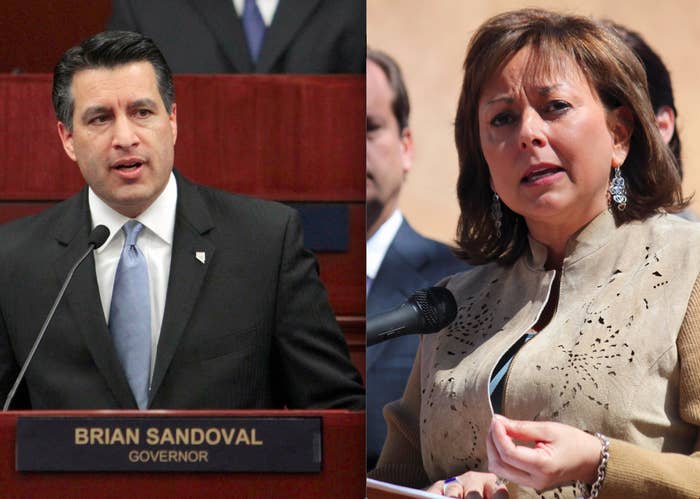
A Republican group whose honorary co-chairs are Govs. Brian Sandoval and Susana Martinez will spend big in 2016 with a singular goal: putting more diverse Republicans in office.
The Republican State Leadership Committee's Future Majority Project is aiming to recruit 250 new candidates to run for state-level office, get 50 of them elected or appointed, and see 10 minority elected officials enter leadership in states around the country, on a $7 million budget, including women.
The PAC actually did something similar in 2014, helping put forward 240 diverse candidates across 40 states (with 43 new minority elected officials on a budget of $6 million for diversity and women).
"Our elected officials at any level do not track with the general public," RSLC president Matt Walter told BuzzFeed News. "We want as many brains as we can have at the table and that's not exclusively a Republican problem."
The Future Majority Project (FMP) began with the goal of identifying, recruiting and training Hispanic candidates to run for office and counts Sandoval and Martinez as the kind of "very principled, right of center thinkers" the group wants to attract, Walter said.
In a statement, Sandoval told BuzzFeed News the FMP mission is to "embrace and empower high quality candidates who reflect the diversity of the communities they seek to represent" and "have the ability to lead our party into the future."
In the wake of the 2012 election, what kind of candidates the party put forward and what kind of voters they appealed to became a dominating topic for the Republican Party. Still, even though Republicans boast more diverse governors than the Democrats, the issue of what the party looks like remains a concern.
Unlike the RNC's Growth and Opportunity project which does its fair share of proselytizing to bring over minorities to the party, FMP executive director Neri Martinez said the group is speaking to people that are already Republican but maybe aren't as politically active or haven't considered running.
Neri Martinez stressed that as a PAC the group had a strict cut off date when they no longer coordinated with candidates, but that while financial support matters, the meat of the program lies in recruiting the right candidates.
Women, she said, are harder to convince to run for office and the group used small business roundtables to go outside of their network to find strong candidates as well. She said mentorship from elected officials has been successful — the kind of thing that could offer a Latina "business owner with three kids, who is wondering how she can do this, someone to talk to."
And the group now has a slate of successful candidates to point to: Illinois Lt. Gov. Evelyn Sanguinetti, the first Latina lieutenant governor; Pennsylvania state Rep. Harry Lewis Jr., who is black and a former teacher, and because he had many Hispanic students when he taught, decided to have his campaign materials printed in English and Spanish; and Ohio state Rep. Niraj J. Antani, 24, who was elected as the first Indian-American Republican and second in the state ever.
He said as he went door to door, people found it refreshing to see a young, diverse candidate running. "The GOP is traditionally seen as monolithic in age and ethnicity, so a young Indian-American Republican getting elected did not seem likely," he said, adding the FMP helped him get elected.
That expectation provides the group with an advantage in promoting candidates — even if growing the party's share of minority votes remains a more complex issue.
Young Kim, a California assemblywoman, helped break the Democratic supermajority and credits the FMP for adding her to their "14 in '14" candidates to watch list as something that helped immeasurably with volunteers and fundraising.
"There are always obstacles when you try to reach new or different voters, but we'll be successful if we continue to elect Republicans who share the same values and experiences as the voters in their districts," she said in an email.
"My experience as the daughter of immigrants who brought me here for a better education and more opportunity resonates with voters not only in the Korean community, but in all immigrant communities."
